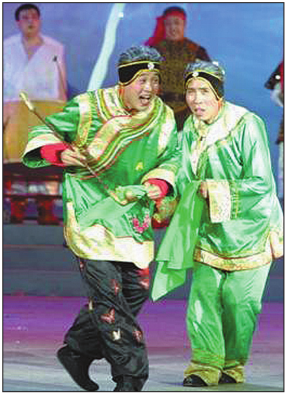
CHINA DAILY
Amateurs dance Manchurian Yangko during a performance.
Zhan Lige is a devoted unprofessional. He simply loves his local traditional square dance.
His love for the Manchurian Yangko dates back more than three decades, when he was 4 years old and still lived in a village near Fushun, Liaoning province.
"Our Manchurian Yangko is a popular square dance in many places. Whenever there is festivity or a fair, we go all out and dance," the 38-year-old traffic management worker says. "And when there is dancing, you'll know the spirits are high."
He calls it a dance of emotions, or more precisely, a dance for ebullience.
"Dance to us is like drinking wine. You dance and shed all your worries. It's pure enjoyment."
"We dance when we're drunk, too," he says. "So our square dance may be a little disorderly, but we're cheerful from the bottom of our hearts."
Compared to the authentic Manchurian Yangko, the square dance has been stripped of most traditional roles and rituals. In the original, there would be two dancers in yellow hoodies and red skirts. They salute each other before letting the group gather in formation, like a bagua (eight diagram tactics). Dancers then mimic taking in the battlefield and begin dancing in pairs, competing against each other, until a horsetail whip signals the end of the dance, explains Zhan.
"Most often, it's danced by the young, it's an occasion to mingle and ogle each other too," says Zhan, who only witnessed such dancing in the countryside when he was young.
The passionate Yangko dance is also one of the nation's intangible cultural heritage items, which tells the story of crusading Manchurians on horseback. For the square dance, the same eight major moves (including charging, leaping, thumping and squatting) mimicking soldiers is the thing to watch.
"Most importantly, keep your heels above the ground (as if riding a horse)," Zhan says.
"Everyone can do it after watching for a bit," says Zhan, who now heads an amateur Manchurian Yangko troupe of 50 people. The group made to the finals of the Galaxy Awards. The troupe practices every week.
"There is no set music and no demanding moves, we dance for hours because we get into a trance," he says. "It's so simple, and all you need for a prop is a fan or handkerchief."
"The state we all desire is this-you dance but you forget you're dancing and go blank," he says. "While people watch us because the dance is uplifting, we are dancing because we are led by feelings from our leaping hearts."
We recommend:
